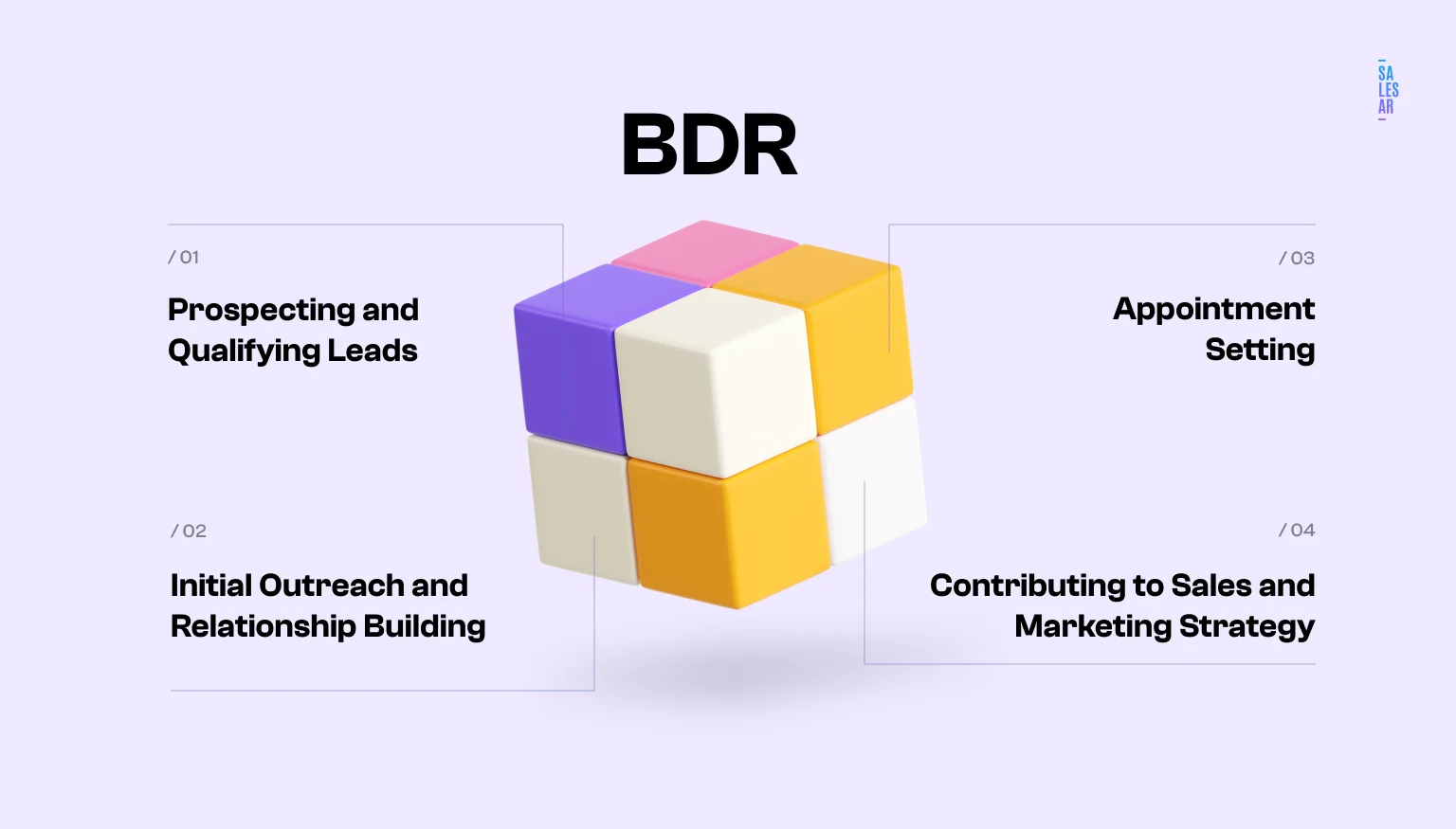In the increasingly competitive business landscape, companies need to continuously strategize, innovate, and expand to stay ahead of their rivals. This is where the role of a Business Development Representative (BDR) comes into play. Acting as a linchpin between sales, marketing, and customer service, BDRs serve a critical function in organizations of all sizes and sectors.
A BDR’s primary responsibility revolves around generating and nurturing new business opportunities, which makes them a fundamental component of any company’s growth strategy. They are the vanguard of an organization’s sales team, often the first point of contact for potential customers, and hence play an instrumental role in shaping the company’s image. This article aims to explore the specifics of a BDR’s role, their responsibilities, and the impact it can have on business development and growth.
The Difference Between BDR and SDR
In the realm of sales and business development, the roles of a BDR and an SDR often get mixed up. While they share similarities, and both are crucial to a company’s growth strategy, they have distinctive roles and responsibilities.
A BDR primarily focuses on the very initial stages of the sales process. Their primary responsibility is to identify new business opportunities, often through market research, networking, and cold outreach. Once they’ve identified and qualified these leads, they pass them on to the sales team for further nurturing and closing. Additionally, BDRs often have a hand in shaping the company’s strategic direction by providing insights on market trends and customer feedback.
An SDR’s role is more aligned with the sales process. They pick up where BDRs leave off, taking the qualified leads and nurturing them through the sales funnel. SDRs conduct follow-up communications, address queries and concerns, and set up meetings or product demonstrations. Their ultimate goal is to move these leads to the final stage of the sales process, where a sales representative can close the deal.
Key Differences
- Focus. While both roles involve working with potential customers, BDRs typically focus on generating new leads (often from cold prospects), while SDRs concentrate on moving these leads through the sales funnel.
- Interaction with Customers. BDRs usually have short, initial interactions with potential customers. They are often the first point of contact, tasked with piquing interest in the company’s products or services. SDRs, on the other hand, tend to have more in-depth interactions with potential customers, discussing their needs in detail and explaining how the company’s offerings can address these needs.
- Skill Set. While both roles require excellent communication skills, BDRs often need more research and strategic thinking skills to identify potential leads and qualify them effectively. On the other hand, SDRs require stronger sales and persuasion skills to nurture leads and move them through the sales funnel.
Despite these differences, both BDRs and SDRs play integral roles in a company’s growth. They work together to create a seamless sales process, ensuring a steady flow of new customers and ultimately driving business success.
The Role and Responsibilities of a BDR
As a job that sits at the crossroads of sales and marketing, the Business Development Representative role can vary considerably from one organization to another. They are typically in charge of the top of the sales funnel, tasked with identifying, qualifying, and nurturing leads before passing them on to sales. This process involves researching potential clients or customers, initiating contact, building relationships, and setting up meetings for the sales team. Once again, these responsibilities vary depending on the business but are a good indicator of the general role BDRs play within an organization.
- Prospecting and Qualifying Leads. This task forms the cornerstone of a BDR’s role. Prospecting involves identifying potential customers, often referred to as “leads”, and requires a good understanding of the company’s target market, industry trends, and the ability to spot businesses that could benefit from the company’s products or services. BDRs often employ various tools and technologies to aid in this process, such as customer relationship management (CRM) systems, outreach-enabling applications, and other sales-focused platforms. Once the prospects are identified, BDRs qualify these leads by gauging their interest and readiness to buy.
- Initial Outreach and Relationship Building. After identifying and qualifying leads, BDRs initiate contact, often through cold calling or emailing. This is a critical step where BDRs make the first impression of the company on potential customers, hence, excellent communication skills and product knowledge are essential. The ultimate goal is to build a rapport with leads and cultivate a relationship that can eventually turn into a business opportunity.
- Appointment Setting. BDRs’ next responsibility is to set up meetings between the qualified leads and the sales team. The goal is to transition the potential customer from the awareness stage to the consideration stage in the sales funnel. This involves understanding the prospect’s availability and ensuring the sales team’s readiness to take over the lead.
- Contributing to Sales and Marketing Strategy. Although BDRs are not typically involved in closing sales or crafting large-scale marketing campaigns, their insights from the front lines can be invaluable for shaping both sales and marketing strategies. By communicating the feedback from potential customers to the respective teams, they can influence product development, pricing strategies, and marketing campaigns.

In short, a BDR’s role consists of a mix of research, sales, and strategy. It is a dynamic job that requires a diverse set of skills, an in-depth understanding of the market, and a proactive approach. By fostering relationships with potential customers, BDRs play a crucial role in driving revenue and business growth. As such, their role is integral to a company’s success and prosperity.
BDRs & SDRs at SalesAR & Our Approach to Growth
Since its inception, SalesAR has perfected the art of balancing its dual mission – creating growth opportunities for its clients while also focusing on its own business expansion. This balance is maintained by clearly distinguishing the roles of BDRs and SDRs at the company.
The BDRs at SalesAR are primarily tasked with expanding the company’s own client base. They’re the engines that drive SalesAR’s growth, engaging with potential clients, and showcasing the value SalesAR brings as a lead generation partner. Given the nature of the industry, this role demands exceptional communication skills, tenacity, and a deep understanding of lead generation and the broader B2B landscape.
With the task of lead research handled by a dedicated department, BDRs at SalesAR can devote their full attention to potential client outreach. They convey SalesAR’s value proposition, demonstrating how the company’s cutting-edge lead generation services can catalyze business growth for potential clients.
On the other hand, SalesAR’s SDRs focus on serving our own existing clients. Their role involves reaching out to potential clients on behalf of SalesAR’s partners, effectively extending the clients’ sales efforts.
The distinction between BDRs and SDRs at SalesAR creates a powerful, two-pronged approach to growth. Each team is able to focus on what they do best, whether that’s expanding SalesAR’s own clientele, or helping to boost our own clients’ businesses.
In short, the work of BDRs and SDRs at SalesAR embodies the company’s mission – to drive growth for the company and our clients. Their targeted, specialized efforts, combined with the diligent work of the research department, create a synergy that enables SalesAR to excel in the competitive world of B2B lead generation, making us one of the top service providers in the world.
The Skills and Qualifications Needed to Become a BDR
A BDR performs a crucial function in forging connections between potential clients and the sales team. The role requires a unique amalgamation of skills and qualifications, which span from exceptional communication and negotiation capabilities to a comprehensive understanding of sales principles and innovative marketing strategies.
Primary Skills
- Effective Communication. Communication stands as one of the most significant skills a BDR should possess. They should be adept at articulating the company’s value proposition in a clear, compelling, and convincing manner. This includes via phone conversations, emails, or during in-person meetings. Their mastery in both written and oral communication aids them in resonating with potential customers, making this skill indispensable for achieving success in the role.
- Negotiation Prowess. While a BDR may not be directly responsible for sealing deals, they nonetheless play a vital role in the negotiation process. They should be skilled in comprehending the needs and apprehensions of potential customers and proposing solutions that mutually benefit both parties. Their negotiation skills lay the groundwork for a smooth and successful sales process.
- Problem-solving Aptitude. In the journey of prospecting, BDRs are bound to encounter challenges – these could range from a lack of interest from potential leads, competition from other businesses, or internal procedural delays. The ability to promptly identify these hurdles and craft effective solutions to overcome them forms an integral part of the BDR’s role.
Educational Qualifications and Relevant Degree Fields
Although BDRs emerge from a vast array of educational backgrounds, possession of a bachelor’s degree in business, marketing, or a related discipline can lay a solid foundation for the role. These degree programs generally impart core concepts like market research, consumer behavior, and sales principles, which are extremely beneficial for a BDR. However, it’s important to note that many organizations put a higher value on practical experience and proven sales skills than specific academic qualifications.
Significance of Industry Knowledge and Experience
An in-depth understanding of the industry is vital for a BDR as it allows them to comprehend the needs and obstacles potential customers face, and identify how their company’s products or services can provide solutions. As such, prior experience in the relevant industry, whether acquired through previous roles, internships, or even academic projects, can give BDR a significant edge over their peers.
Proficiency in CRM Software
With the proliferation of technology in today’s business landscape, BDRs are frequently required to demonstrate proficiency in using Customer Relationship Management systems and other sales facilitation tools. These software platforms aid BDRs in managing leads, tracking communication histories, and scrutinizing sales data, making them an essential tool for anyone in this role.
How a BDR Contributes to Business Growth
BDRs are instrumental in pushing the boundaries of a business’s potential and stimulating growth. The primary and most immediate impact of a BDR’s work is seen in sales revenue. By identifying and qualifying leads, BDRs ensure that sales teams have a steady stream of potential customers to engage with, significantly boosting the chances of successful conversions.
BDRs also play a crucial role in identifying and exploring new markets. By conducting market research, studying industry trends, and maintaining an understanding of competitor activities, they can uncover opportunities for expansion, whether it’s targeting a new demographic, entering a new geographical region, or even launching a new product.
Furthermore, the unique position of BDRs allows them to gather insightful feedback from potential customers. They are privy to the needs, preferences, and pain points of their target market. This information, when relayed to product development or service improvement teams, can lead to enhancements that make the company’s offering more attractive to potential customers, thereby increasing sales and market share.
Current Trends and Future Outlook for BDRs
The role of Business Development Representatives (BDRs) has been in a constant state of flux, continually molded by technological advancements and changes within the broader business landscape. As organizations navigate through a complex digital world, the importance of a capable and effective BDR becomes increasingly evident.
Adoption of Digital Tools and Technologies
The advent of digital technology has radically altered the way BDRs operate, and it’s become a vital aspect of their work. Digital tools such as CRM systems, automated marketing platforms, and data analytics software have become instrumental in reshaping the BDR’s role, enabling them to manage a higher volume of leads, while also allowing for the personalization of their outreach efforts, making interactions more meaningful and impactful.
The integration of artificial intelligence in these tools is an emerging trend that looks promising for the future. AI and machine learning have the potential to automate repetitive tasks, offer insights through predictive analysis, and help in the effective segmentation of potential leads. Such advancements can lead to even greater efficiency and precision in the role of the BDR.
Impact of Remote Work Trends
Another trend reshaping the BDR landscape is the shift towards remote work, spurred on by recent global events. This transition has made a significant impact on BDRs’ operations. Freed from geographical constraints, BDRs can now prospect and nurture leads from across the globe, offering an unparalleled scope for business expansion.
However, this new working model also presents its challenges. Building and maintaining relationships in a virtual environment requires different skills than those in a traditional setting. Digital communication and the ability to build rapport virtually have become key skill sets, necessitating a shift in the training and development of BDRs.

Predictions for the Future
Looking toward the future, there are strong indications that the demand for skilled BDRs will only continue to rise. As competition intensifies in an increasingly global and digital market, businesses will lean more heavily on their BDRs. These professionals will be relied upon not only to identify opportunities but also to build sustainable relationships and drive growth.
To meet these demands, BDRs of the future will need to be highly adaptive, tech-savvy, and adept at navigating the digital world. They will also need to be proficient in virtual relationship building, and able to leverage technology to manage and foster relationships across the globe. Therefore, the role of a BDR will likely become more complex and integral to the success of businesses in the years to come.
Conclusion
BDRs are the driving force behind an organization’s growth, identifying opportunities, fostering relationships, and facilitating the sales process. Moreover, their ability to provide market insights and contribute to product development makes them a crucial asset beyond just sales and marketing.
As the business landscape evolves, so does the role of the BDR.
The integration of digital technologies and the shift towards remote work has reshaped how BDRs operate, presenting both new challenges and opportunities. However, one thing remains clear – BDRs will continue to play an integral role in business growth and sustainability, making them an invaluable addition to any organization.




